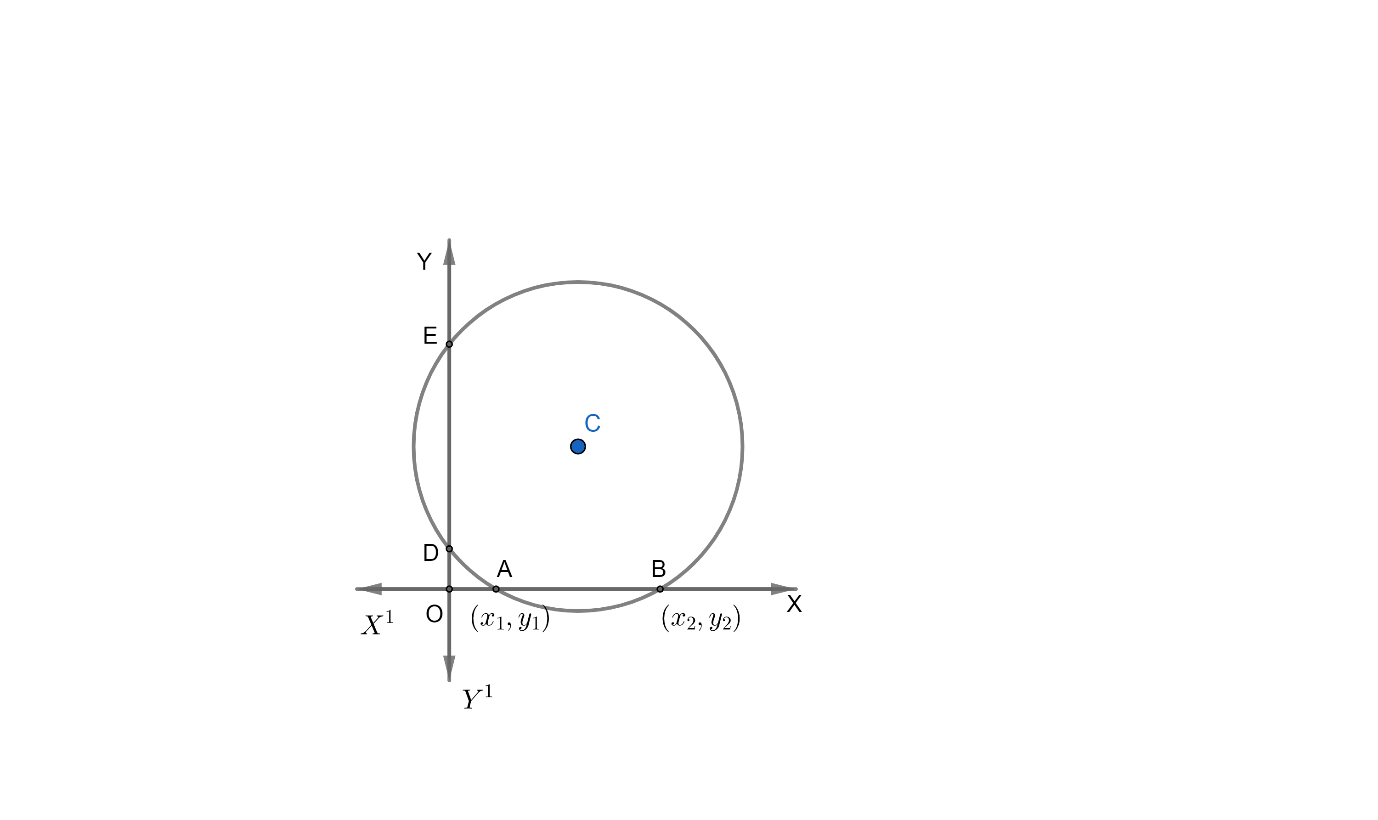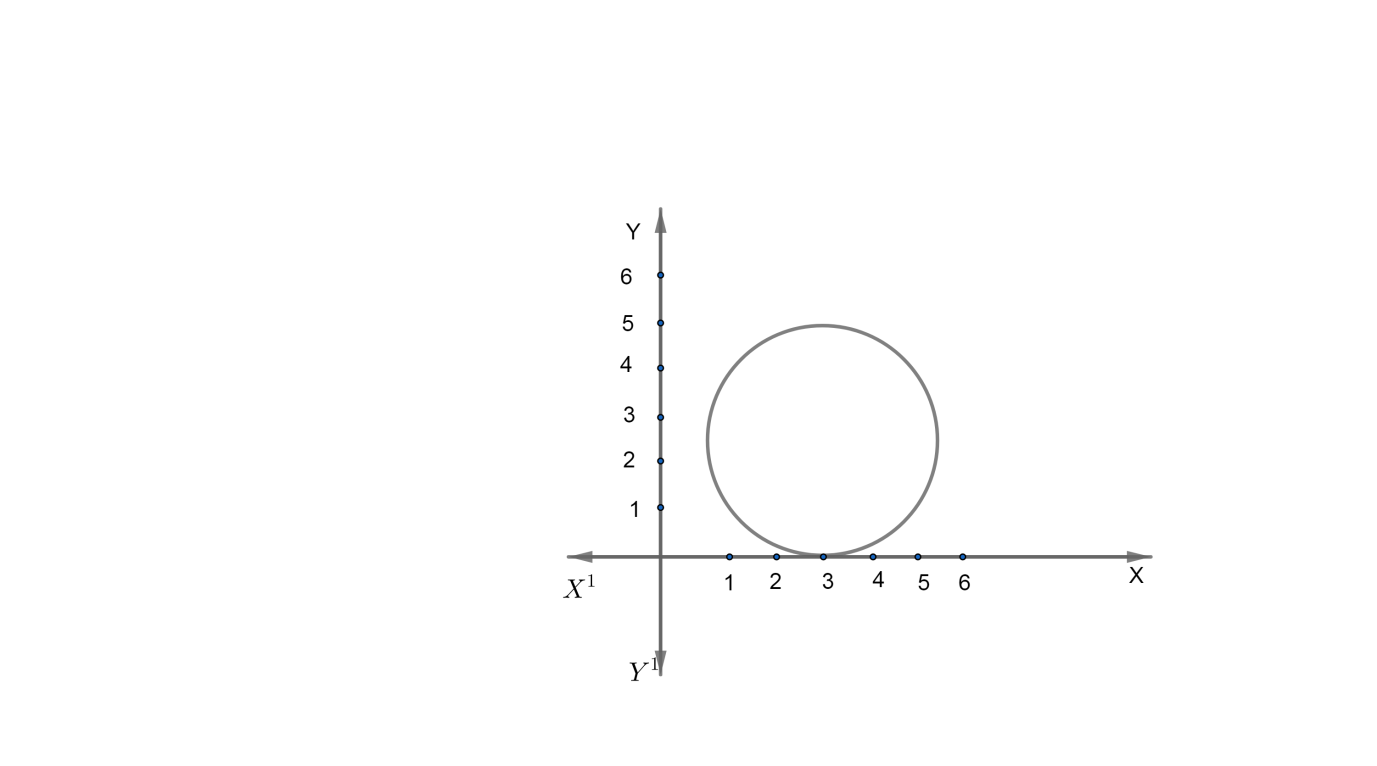Question
Question: The equation of the circle which touches \(x-axis\) at \(\left( 3,0 \right)\) and passes through \(\...
The equation of the circle which touches x−axis at (3,0) and passes through (1,4) is given by
(a) x2+y2−6x−5y+9=0
(b) x2+y2+6x+5y−9=0
(c) x2+y2−6x+5y−9=0
(d) x2+y2+6x−5y+9=0
Solution
Hint: From the equation of circle, find the x−intercept by putting y=0. Substitute the values in the equation of the circle and put (x,y)=(3,0) and (1,4) as it passes through the circle and get the value of the centres of the circle.
Complete step by step answer:
We know that equation of the circle,
x2+y2+2gx+2fy+c=0.......................(1)
Here, the centre of circle =(−g,−f)
We need to find the x- intercept of the circle.

Consider the figure drawn.
Let AB be the intercept made by the given circle on x−axis.
Since on x−axis,y=0 .
∴x- coordinate of the points
A and Bare the root of the equation x2+2gx+c=0.......................(2)
∵ Substituting y=0 in equation (1) to obtain equation (2)
Let x1 and x2 be the x-coordinates of points A and B respectively
Then, x1 and x2also the roots of the equation x2+2gx+c=0
∴x1+x2=−2gx1.x2=c∵Where, x1=−g,x2=−g
X-coordinates
Clearly the intercept on x−axis=AB
=x2−x1=(x2−x1)2
We know (a2−b2)=(a−b)(a+b) or (a2−b2)=(a+b)2−4ab
(x1+x2)2−4x1x2=(−2g)2−4c=4g2−4c=4(g2−c)=2g2−c
∴We got the x− intercept made by circle on the x−axis
=2g2−c.............(3)
Now, the circle touches x−axis
2g2−c=0∴c=g2.............(4)
Substitute the value of equation (4) in equation (1)
x2+y2+2gx+2fy+g2=0................(5)
Given that the circle passes through (3,0) and (1,4)
Consider point (x,y)=(3,0) and substitute in equation (5)
∴32+02+2g×3+0+g2=0
⇒9+6g+g2=0
Consider the quadratic equation g2+6g+9=0.........(6)
By using the quadratic formula, we can solve this equation (6)
It is of the form ax2+bx+c=0
And the equation we got g2+6g+9=0
[i.e.,x=g]
From the equation we get the values of a,b,c as
a=1,b=6,c=9
Put the values in the quadratic formula to obtain the roots
2a−b±b2−4ac=2×1−6±36−4×1×9=2−6±36−36=2−6±0=2−6=−3
∴g=−3
By substituting (x,y)=(1,4) in equation (5)
x2+y2+2gx+2fy+g2=0
11+42+2×(−3)×1+2f×4+(−3)2=01+16−6+8f+9=0⇒20+8f=0∴f=2−5
Hence the equation of the circle become,
x2+y2+2gx+2fy+c=0x2+y2+2(−3)x+2(2−5)y+9=0⇒x2+y2−6x−5y+9=0
Hence the correct answer is option (a).
Note: (i) In a question like you should be careful with the calculation part as not to mix up the sign.
The solutions options are similar and if you get the sign wrong. You might get the wrong answer and thus choose the wrong solution.
(ii) The intercept is the crossing point, and the x - intercept of a graph refers to the point at which the equation crosses the x−axis of the coordinate plane.

